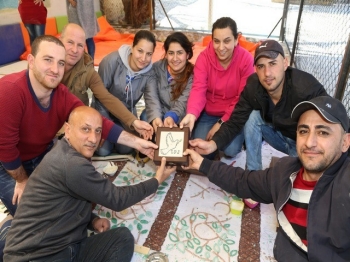A mosaic laboratory serving refugees in Jordan

In order to support Iraqi Christian refugees in Jordan, the Latin Patriarchate of Jerusalem has launched a new project called “Living Mosaic”.
This project consists of forming some refugees so that they can create mosaics, from design to production, using various traditional techniques and instruments such as the hammer.
Given the rich craft history of Byzantine and Umayyad mosaics, the project is being carried out in the city of Madaba. The workshop is a positive element for refugees in many ways. On the one hand, employment will allow them to earn 10 Jordanian dinars each day, and to ensure daily subsistence, as well as the opportunity to sell works to various institutions. On the other hand, the workshop is an opportunity for them to take advantage of their idle time, learning new skills and acquiring professional knowledge.
More generally, this project enriches refugees in Jordan by giving them an occupation as well as helping them better prepare for transfer to another country. The Latin Patriarchate finances materials such as stone, pincers, mortar and wood fibers.
The first month of training allowed ten families to venture into the field, and in the following two months, another ten families joined the project. Following some traditional motifs, these refugee families make mosaics on different wooden supports, with stones mainly from Jordan. For the parish of Al-Huson, they created a large mosaic that resembles the eastern motifs of the Dutch painter Piet Gerrits, depicting the creation with twigs, angels, doves, trees and rivers.
The laboratory currently produces numerous mosaic models and awaits buyers in order to support the activity of these households. This project for refugees aims to help them stabilize and start again, thanks to this activity in the mosaics sector.
In the spring of 2017, twenty-one Iraqis were engaged in the Madaba atelier daily. In addition to enhancing individual technical skills, they found a community of belonging and especially a meaning to give to their days.
Charles-Edouard Guilbert
(Summer 2017)



